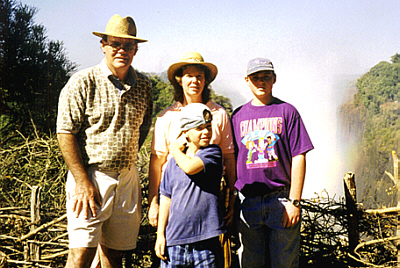General Board of Global Ministries
![]()
UM Information
UM
Reporter
![]()
Florida Southern College
![]()
Bethune
Cookman College
![]()
FL UM Children's Home
![]()
|
|
Missionary family escapes danger |
|
By Michael Wacht ST. PETERSBURG — Road blocks, vehicle searches, two weeks of detainment and questioning, his wife held at gunpoint and hand grenades held in front of his face were not what Delbert Groves was expecting while doing missionary work in the Democratic Republic of the Congo, formerly Zaire. When that nation’s three-year civil war began hitting close to home, Groves said it was time to get his family to safety. "I just said, ‘Sandy, it’s time for us to get out of the country," he said. "Our work there is going well and our heart is there, but we’re going to wait until the craziness is over." Groves is a member of Orlando’s Pine Castle United Methodist Church and has been a missionary in Congo off and on since 1982. He and his family—his wife, Sandy, and two of his sons, Seth, 14, and Nathan, 10—have lived in Congo full time since 1992. Prior to returning to Florida for the current school year, the Groves family lived in Kolwezi, a mining village in the southern part of the country near the Zambian border. Delbert Groves, who owned a print shop in Orlando prior to becoming a missionary, set up and ran a printing shop in the village. It is called "Uzima Mupya," which is Swahili for New Creation. Groves printed Bibles in Swahili and French, as well as letterhead and Bible study materials. He was working on a song book and Bible story book in the local language when his family left. Groves’ wife is a medical lab technologist who worked in the Kolwezi Poli-Clinique, an old hotel missionaries converted to a hospital. The clinic provides minor surgical and maternity services for the area. Groves said his wife’s goal is to build a laboratory and set up a nurse training facility when they return. "A microscope and training is all that’s needed," he said. Groves said he misses his work, friends, partners and colleagues in Congo and is "very sad" over events in the nation. "It breaks our hearts to see what’s going on," Groves said. "The rebels have taken land and butchered people…they’ve made it illegal to change money so you can’t get money into the country to support ministry…and they’re driving people out of the country." Despite peace treaties that have been signed, he said the fighting continues, and he expects the country will eventually be divided. When European nations were colonizing Africa, they created countries that cut across cultures and people, according to Groves. The people of Katanga, in the southern part of the country, merged into what was then Zaire. That is the land the rebels now hold. "The Africans want to get back to their traditions," he said. The civil war is not the only difficulty missionaries in Africa face, Groves said. The United Methodist Church structure reflects tribal structures there. Unchurched people don’t see a difference between their lives and life in the church. They see the church as another tribe in competition with their own.
"The word for bishop is the same as the word for chief in Africa," he said. Different understandings of sin also make evangelistic work more difficult. "Sin is not sin as we know it," Groves said. "Here, if you cheat on your wife, your conscience gets to you. In Africa, it’s called shame, and if you get caught, you’re shamed." And shame only happens because someone tells about a misdeed, according to Groves. "If you’re shamed, you get to go to a witchdoctor and put a curse on the person who shamed you," he said. "If they get sick and die, you’re very powerful." While the work his family has and will be doing again in Congo is full of dangers and hardships, Groves said he is most disappointed at the lack of support from people at home. "We’re your missionaries," he said. "The members at Pine Castle…and possibly a dozen other churches do much with us." While in Florida, Groves is visiting churches to raise awareness of his family’s work and money to expand that work, which includes purchasing $60,000’s worth of printing press equipment. Groves says the number of missionaries in the field is declining, and a lack of understanding what missions is all about is one reason. "I think the church misses the objective of missions," Groves said. "Our objective is to be that link to people, building the kingdom of God. Missions is not just in Africa, missions is everywhere." The family’s mission work is done through the denomination’s General Board of Global Ministries (GBGM), and they receive support through an Advance Special. Because GBGM administration is supported by connectional giving, or apportionments, 100 percent of donations given to the Advance Special directly benefit the Groves’ and their ministries. Support for the Groves’ salaries can be given through Advance Special 012150-1. Donations to support their projects, including the print shop and medical laboratory, can be made through Pine Castle United Methodist Church, 407-438-2700. Top
of this page |
||||


